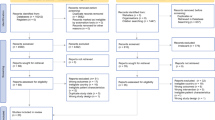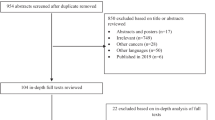Abstract
Purpose
Breast cancer is one of the most common diseases, affecting many thousands of women. Although more than 80% of women survive the experience, very few studies have been conducted to examine the question of resilience among long-term survivors of breast cancer. The aim of this study is to describe the clinical and sociodemographic factors that correlate with greater resilience in women survivors of breast cancer, in the Costa del Sol Health Area (Spain).
Methods
Accordingly, a descriptive cross-sectional study was conducted, with respect to 59 survivors of breast cancer, who each completed a questionnaire for analysis according to the Connor-Davidson Resilience Scale (CD-RISC).
Results
The median resilience score was 77 (interquartile range 70–80). The group of patients who had survived for six or more years since the diagnosis had a higher score for total resilience (90: IR 76–92) than those diagnosed more recently (74: IR 65.7–83.7) (p = 0.012). Regarding the patients’ education background, the group with no formal qualifications or only primary studies had a score of 72 (IR 64–84), versus 79 (IR 74–89.7) for the group with higher levels of education (p = 0.016). Of the clinical variables, only the administration of chemotherapy was significantly associated with the score obtained on the CD-RISC scale (p = 0.012).
Conclusions
The results obtained in this study lead us to conclude that sociodemographic and clinical factors have a positive impact on the level of resilience among women resident in the Costa del Sol Health Area and who are long-term survivors of breast cancer.

Similar content being viewed by others
References
Ferlay J, Soerjomataram I, Dikshit R, Eser S, Mathers C, Rebelo M, Parkin DM, Forman D, Bray F (2015) Cancer incidence and mortality worldwide: sources, methods and major patterns in GLOBOCAN 2012. Int J Cancer 136:E359–E386. https://doi.org/10.1002/ijc.29210
Barnadas A, Algara M, Cordoba O, Casas A, Gonzalez M, Marzo M, Montero A, Muñoz M, Ruiz A, Santolaya F, Fernandez T (2017) Recommendations for the follow-up care of female breast cancer survivors: a guideline of the Spanish Society of Medical Oncology (SEOM), Spanish Society of General Medicine (SEMERGEN), Spanish Society for Family and Community Medicine (SEMFYC), Spanish So. Clin Transl Oncol 20:687–694. https://doi.org/10.1007/s12094-017-1801-4
Escobar A, Trujillo-Martin Mdel M, Rueda A et al (2015) Cross-cultural adaptation, reliability and validity of the Spanish version of the Quality of Life in Adult Cancer Survivors (QLACS) questionnaire: application in a sample of short-term survivors. Health Qual Life Outcomes 13:182. https://doi.org/10.1186/s12955-015-0378-2
Loprinzi CE, Prasad K, Schroeder DR, Sood A (2011) Stress Management and Resilience Training (SMART) program to decrease stress and enhance resilience among breast cancer survivors: a pilot randomized clinical trial. Clin Breast Cancer 11:364–368. https://doi.org/10.1016/j.clbc.2011.06.008
Ungar M (2011) The social ecology of resilience: addressing contextual and cultural ambiguity of a nascent construct. Am J Orthopsychiatry 81:1–17. https://doi.org/10.1111/j.1939-0025.2010.01067.x
Gooding PA, Hurst A, Johnson J, Tarrier N (2012) Psychological resilience in young and older adults. Int J Geriatr Psychiatry 27:262–270. https://doi.org/10.1002/gps.2712
Connor KM, Davidson JRT (2003) Development of a new resilience scale: the Connor-Davidson Resilience Scale (CD-RISC). Depress Anxiety 18:76–82. https://doi.org/10.1002/da.10113
Rosa F, Bagnasco A, Aleo G, Kendall S, Sasso L (2017) Resilience as a concept for understanding family caregiving of adults with chronic obstructive pulmonary disease (COPD): an integrative review. Nurs Open 4:61–75. https://doi.org/10.1002/nop2.63
Boell JEW, da Silva DMGV, Hegadoren KM (2016) Sociodemographic factors and health conditions associated with the resilience of people with chronic diseases: a cross sectional study. Rev Lat Am Enfermagem 24:e2786. https://doi.org/10.1590/1518-8345.1205.2786
Farber EW, Schwartz JA, Schaper PE et al (2000) Resilience factors associated with adaptation to HIV disease. Psychosomatics 41:140–146. https://doi.org/10.1176/appi.psy.41.2.140
Dubey C, De Maria J, Hoeppli C et al (2015) Resilience and unmet supportive care needs in patients with cancer during early treatment: a descriptive study. Eur J Oncol Nurs 19:582–588. https://doi.org/10.1016/j.ejon.2015.03.004
Greenlee H, DuPont-Reyes MJ, Balneaves LG et al (2017) Clinical practice guidelines on the evidence-based use of integrative therapies during and after breast cancer treatment. CA Cancer J Clin 67:194–232. https://doi.org/10.3322/caac.21397
Instituto Nacional de Estadísitica. Cifras del Padrón Municipal 2016. In: INESBASE. http://www.ine.es/dyngs/INEbase/es/operacion.htm?c=Estadistica_C&cid=1254736177011&menu=resultados&idp=1254734710990. Accessed 20 Feb 2018
Crespo M, Fernández-Lansac V, Soberón C (2014) Spanish version of the CD-RISC resilience scale for chronic stress situations. Behav Psychol 22:219–238
The Connor-Davidson Resilience Scale (2016) CD-RISC. http://www.cd-risc.com. Accessed 10 Dec 2017
Carreira H, Williams R, Muller M et al (2017) Adverse mental health outcomes in breast cancer survivors compared to women who did not have cancer: systematic review protocol. Syst Rev 6:162. https://doi.org/10.1186/s13643-017-0551-2
Dantas de Oliveira NP, Guedes TSR, Holanda AM et al (2017) Functional disability in women submitted to breast cancer treatment. Asian Pac J Cancer Prev 18:1207–1214. https://doi.org/10.22034/APJCP.2017.18.5.1207
Antunez JM, Navarro JF, Adan A (2015) Circadian typology is related to resilience and optimism in healthy adults. Chronobiol Int 32:524–530. https://doi.org/10.3109/07420528.2015.1008700
Notario-Pacheco B, Solera-Martinez M, Serrano-Parra MD et al (2011) Reliability and validity of the Spanish version of the 10-item Connor-Davidson Resilience Scale (10-item CD-RISC) in young adults. Health Qual Life Outcomes 9:63. https://doi.org/10.1186/1477-7525-9-63
Rodriguez Vega B, Orgaz Barnier P, Bayon C et al (2012) Differences in depressed oncologic patients’ narratives after receiving two different therapeutic interventions for depression: a qualitative study. Psycho-Oncology 21:1292–1298. https://doi.org/10.1002/pon.2036
Markovitz SE, Schrooten W, Arntz A, Peters ML (2015) Resilience as a predictor for emotional response to the diagnosis and surgery in breast cancer patients. Psycho-Oncology 24:1639–1645. https://doi.org/10.1002/pon.3834
Kim KJ, Conger RD, Elder GHJ, Lorenz FO (2003) Reciprocal influences between stressful life events and adolescent internalizing and externalizing problems. Child Dev 74:127–143
Kraaij V, Garnefski N, de Wilde EJ, Dijkstra A, Gebhardt W, Maes S, ter Doest L (2003) Negative life events and depressive symptoms in late adolescence: bonding and cognitive coping as vulnerability factors? J Youth Adolesc 32:185–193. https://doi.org/10.1023/A:1022543419747
Ma L-C, Chang H-J, Liu Y-M, Hsieh HL, Lo L, Lin MY, Lu KC (2013) The relationship between health-promoting behaviors and resilience in patients with chronic kidney disease. ScientificWorldJournal 2013:124973–124977. https://doi.org/10.1155/2013/124973
Barlow C, Cooke D, Mulligan K, Beck E, Newman S (2010) A critical review of self-management and educational interventions in inflammatory bowel disease. Gastroenterol Nurs 33:11–18. https://doi.org/10.1097/SGA.0b013e3181ca03cc
Hwang SY, Chang SJ, Park B-W (2013) Does chemotherapy really affect the quality of life of women with breast cancer? J Breast Cancer 16:229–235. https://doi.org/10.4048/jbc.2013.16.2.229
Acknowledgments
We are grateful for the support received from the Costa del Sol Health Agency, particularly the Research Unit, and we also thank all the women who took part in this study.
Author information
Authors and Affiliations
Corresponding author
Ethics declarations
In all respects, the present study complies with the Helsinki Declaration and with applicable legislation on the protection of patients’ rights (Act 15/2002). All data were recorded anonymously, in strict accordance with the laws and data protection regulations in force (Act 41/2002 of 14 November; Act 15/1999 of 15 December). The study was approved by the Costa del Sol Research Ethics Committee on 26 October 2016, under internal code number 005_oct_PR-Resiliencia.
Conflict of interest
The authors declare that they have no competing interests.
Additional information
Publisher’s Note
Springer Nature remains neutral with regard to jurisdictional claims in published maps and institutional affiliations.
Rights and permissions
About this article
Cite this article
Padilla-Ruiz, M., Ruiz-Román, C., Pérez-Ruiz, E. et al. Clinical and sociodemographic factors that may influence the resilience of women surviving breast cancer: cross-sectional study. Support Care Cancer 27, 1279–1286 (2019). https://doi.org/10.1007/s00520-018-4612-4
Received:
Accepted:
Published:
Issue Date:
DOI: https://doi.org/10.1007/s00520-018-4612-4




